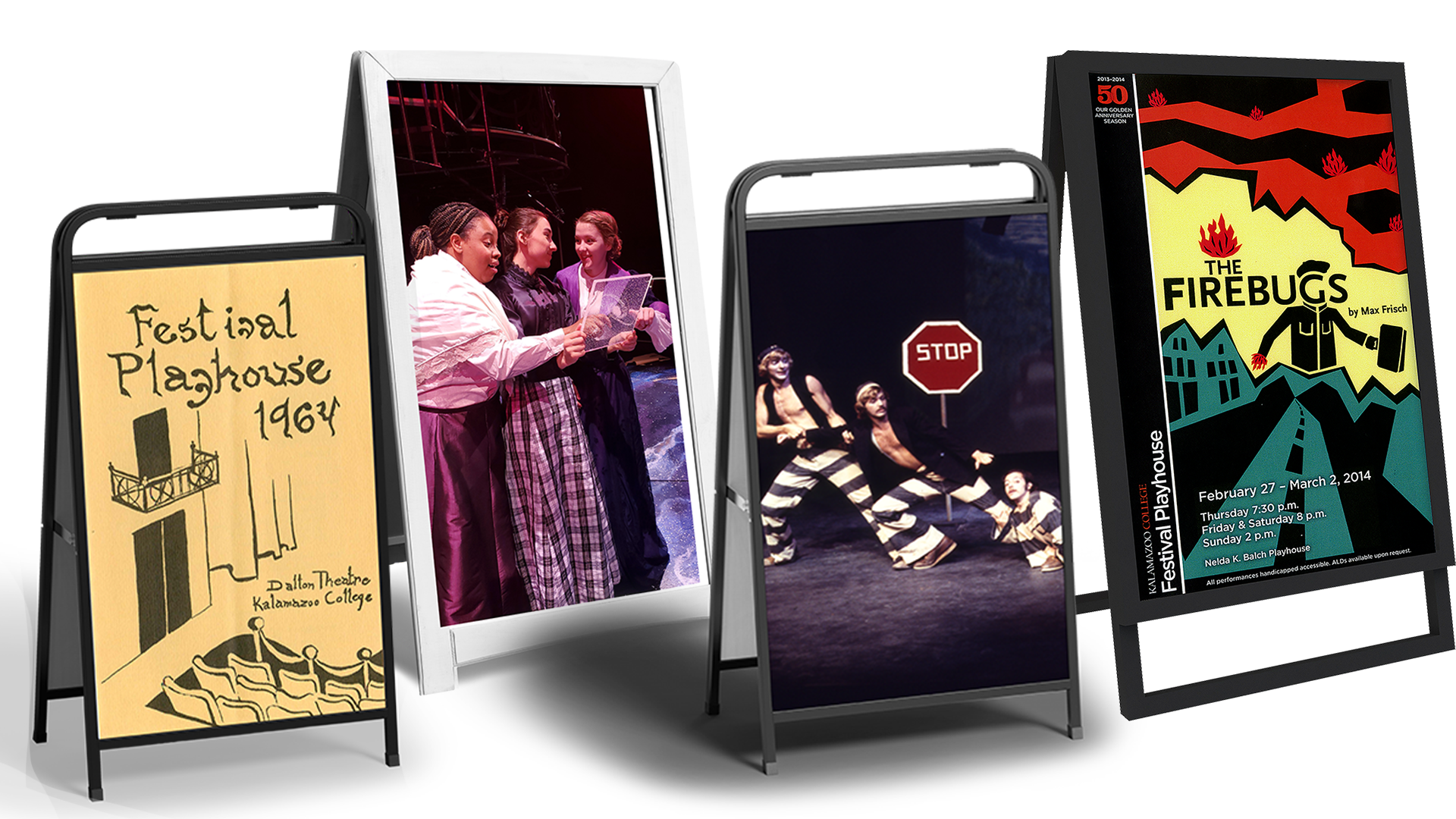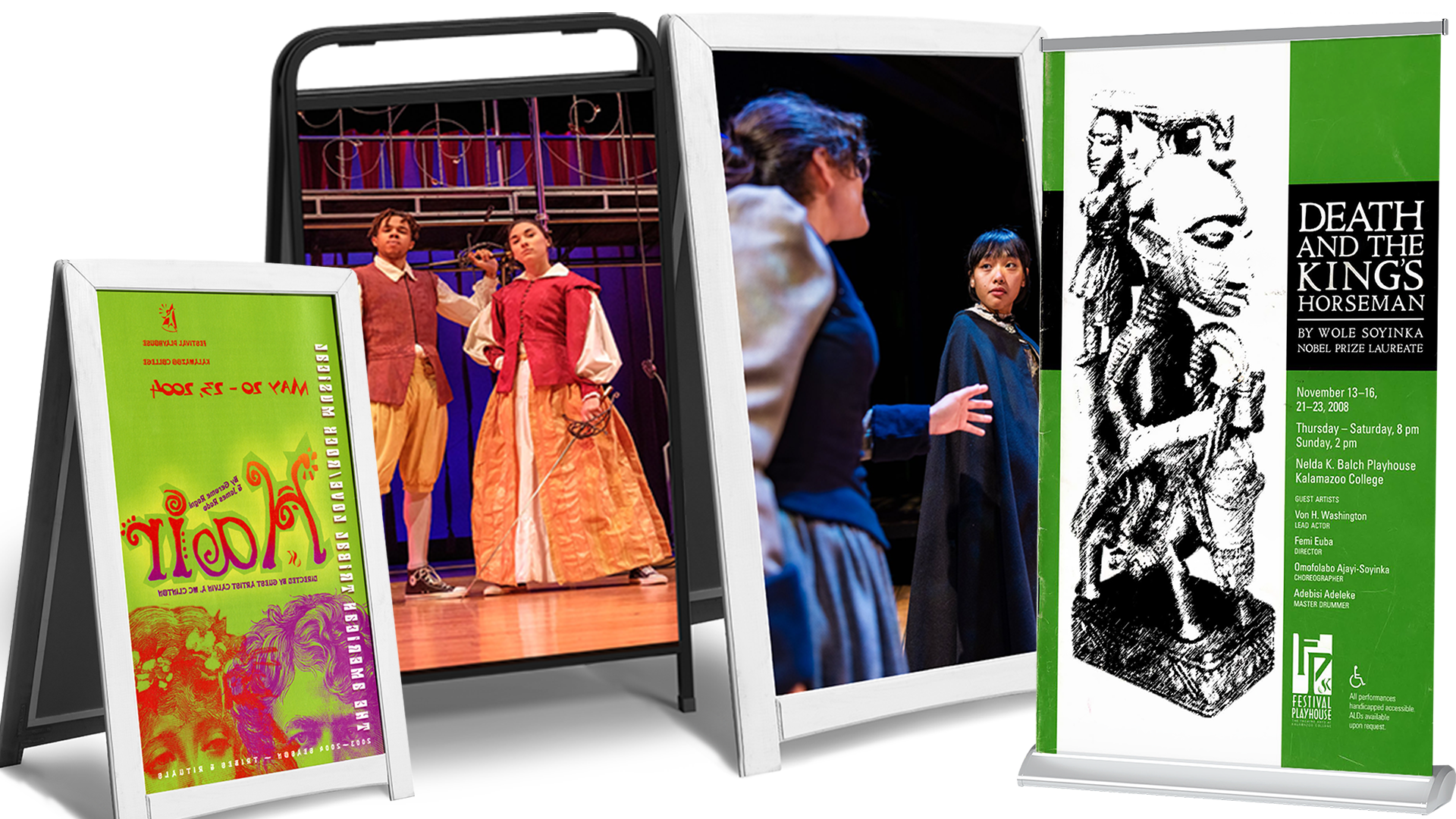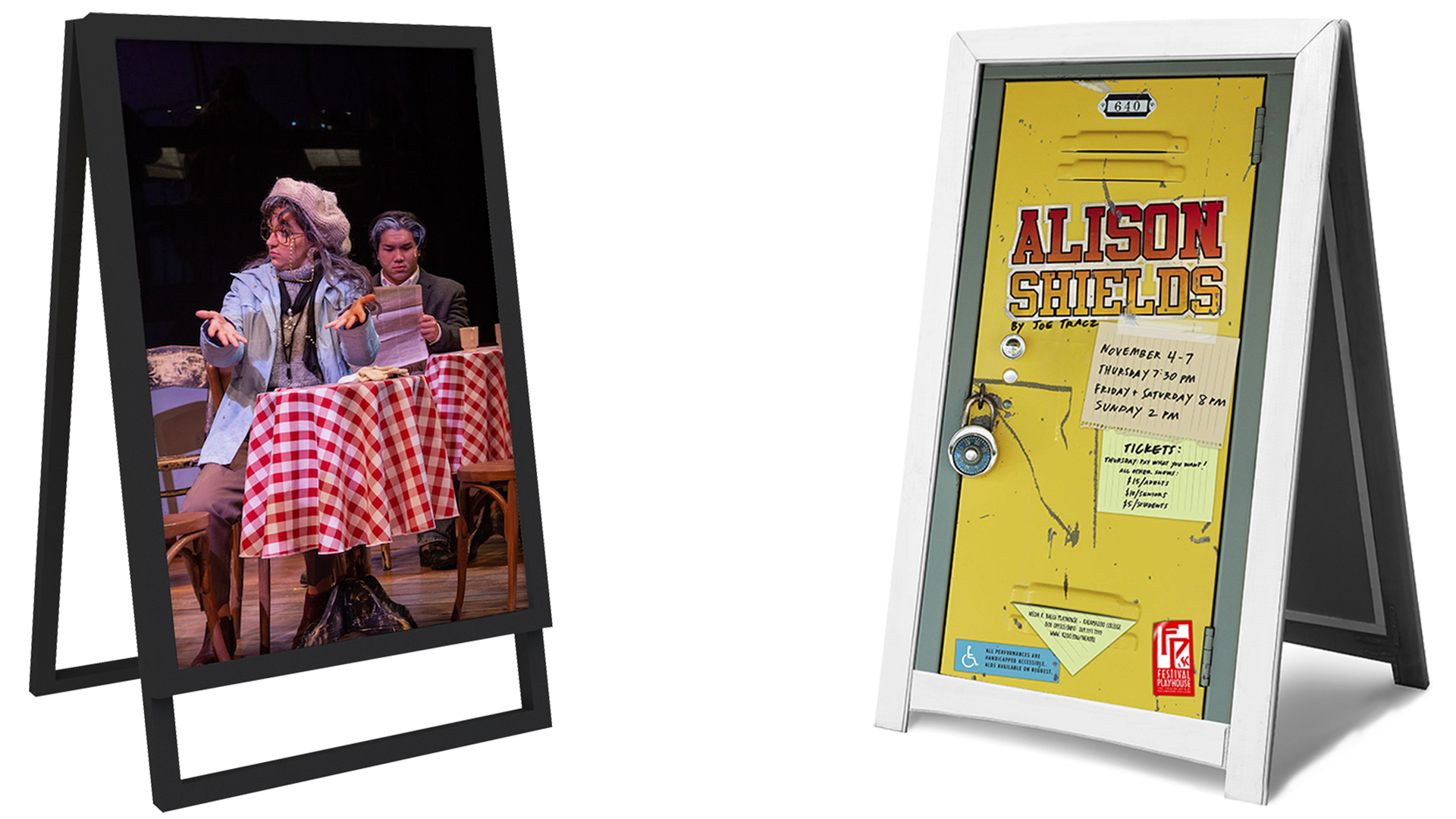
When the curtain rises on the final productions of its milestone 60th season, the Kalamazoo College Festival Playhouse will return to its roots, offering students enriching experiences that will echo the Playhouse’s pioneering spirit.
To date, this season’s theme has been “Systems as Old as Time” featuring plays that explore the harmful systems that hold back the oppressed while highlighting the ways that joy, laughter and solidarity can exist and thrive despite those systems.
The productions have included Playhouse Creatures, a play that takes place in 1669 as theatres in England are reopening after 17 years of Puritan suppression; Dutchman, a one-act play in which a young bourgeois Black man is killed by a calculating white seductress (written in 1964, the play appears as a contemporary post-George Floyd commentary upon existing white racism); and Be More Chill, written by Playhouse alumnus Joe Tracz ’04, where an average teenager swallows a tiny supercomputer that promises to make him popular—examining issues of social shaming and conformism in the process.
When the academic year ends, the Playhouse stage will be rocking into summer with the Farmers Alley Theatre production of School of Rock. Based on the hit film starring Jack Black, the musical follows a failed rock star who poses as a substitute teacher at a prestigious prep school. There he turns a class of bright and well-accomplished students into a rock band, which will be played by a real-life school of rock, the Kalamazoo Academy of Rock. The Festival Playhouse also will host Farmers Alley for a production of the 25th Annual Putnam County Spelling Bee, a musical comedy featuring six quirky adolescents who vie for the spelling championship of a lifetime.

Both productions will bring together a professional theatre company and members of the Kalamazoo College theatre community, giving K students the opportunity to work beside local and Actors’ Equity Association professionals, just as Playhouse students did through summer stock productions beginning in 1964.
“Farmers Alley was looking for another venue where they could do some larger plays that aren’t suitable for their space at 221 Famers Alley, and of course, I’ve had our 60th anniversary on my radar for a couple of years,” said Lanny Potts, artistic director of the Festival Playhouse Theatre and K professor of theatre arts.
“This just seemed like a kismet opportunity, where we could combine some of the history and richness of the Festival Playhouse and what it used to be with a current equity theatre experience. We’re able to provide some space, but really this is about giving students the opportunity to work alongside an equity stage manager, equity performers and professional outside directors,” said Potts, who designed the Farmers Alley Theatre space and serves on its board.

The history behind the Playhouse and its summer stock offerings can be traced to 1954, before its first productions, when Nelda K. Balch arrived at Kalamazoo College. Balch personally developed the theatre department and created the Festival Playhouse as a theatre company, while holding many titles at K, including department chair, professor and managing director.
Dorothy U. Dalton at the time was a founding member and board member of the Kalamazoo Civic Players. She had nurtured her own love of theatre as a K student in the 1910s when she starred as Caliban in a production of The Tempest before performing for the Provincetown Players and Washington Square Players, and serving as an assistant director for the War Camp Community Service during World War I. When she returned to Kalamazoo, Dalton and Balch became artistic kindred spirits, as both were interested in what is now known as “activating theatre” and providing “theatre with a consciousness” to connect a community with significant and relevant theatre arts experiences.
Dalton was an integral partner in the development of the Light Fine Arts Building, as well as the Dalton Theatre, Dungeon Theatre and Playhouse Theatre. Her seed money helped Balch grow the Festival Playhouse into the professional producing, nonprofit arm of K’s theatre program. Festival Playhouse began in 1964 as a summer stock theatre company. Professional actors and artists worked with students during the summer months, offering what then was a unique experience for students in an academic theatre program, empowered in part by the College’s former year-round academic calendar.
“I think it’s one reason why we have such a deep well of historically terrific alums coming out of the K theatre program,” Potts said. “We really were at the forefront of an initiative and idea that quickly caught on.”

In 1964, its first productions included Waiting for Godot, The Firebugs, The Chairs and The Resounding Tinkle, which were staged at the newly opened Dalton Theatre. The brick-and-mortar Playhouse later was constructed in 1976 and opened in 1977 before being named the Nelda K. Balch Playhouse after her retirement in 1981. Modeled after the Guthrie Theatre in Minneapolis, the theatre was built with—and still features—Michigan’s first thrust stage, meaning it places the audience on three sides of the scenery.
Balch continued to teach and direct students as a professor emerita, and by 1985, she had directed and performed in more than 200 productions. The Playhouse honored her again in 1999 by producing her play Return Engagement: A Dorothy Dalton Tribute.
Dalton died in 1981, yet her support of the Festival Playhouse lives on through funding from the Dorothy U. Dalton Foundation. Balch passed away in 2011, and her enduring impact still influences the experiences of students today.
Changes in the College’s academic calendar led the Festival Playhouse to shift from summer stock productions each year toward its current fall, winter and spring shows. Today, a student advisory group selects each season’s productions in what Potts describes as an amazing process.
“Students meet every other week,” Potts said. “They sit around a table, eat bad snacks, and they talk about plays that they’ve read. One of the group’s criteria is that they don’t just select plays they want to do. Instead, we ask ourselves, ‘why this play, why now, why here?’ We look at classics and modern plays and we look at musicals. We look at BIPOC playwrights and opportunities for performers of color. We’re looking at different genres, different historical periods, and if we’re going to do a play, we will look at it through a lens of social justice initiatives and ideas. We think the full richness of the canon can be produced in ways that give us insight into our understanding of needs right now.”
The students behind these efforts are successful, Potts said, because they seek and come from a wide breadth of experiences. For example, this year’s stage-management team includes engineering, biology, chemistry and biochemistry majors.
“I don’t know if people know what stage managers do, but they are the glue that holds the fabric of the production together,” Potts said. “Without a stage manager, we just don’t do theatre. If you think about the normal number of activities that K students do, and then imagine being a stage manager for a theatre production, you can imagine it being a heavy lift.”
The Playhouse is there when students seek opportunities in theatre, regardless of the fields they ultimately choose. And the benefit of a liberal arts college like K is that all students who venture into the theatre department can find opportunities to learn from our professional faculty and staff, to experience working with guest artists on stage and behind the scenes, to participate at the Kennedy Center American College Theatre Festival, or to connect with theatre programs via internships or study abroad or study away programming—no theatre major required.
“I think Kalamazoo College attracts the type of student who has an extraordinary panoply of interests and things that they want to engage with,” Potts said. “We have students who want to do STEM, psychology, business, history and English. But they also like music, art and theatre, so the theatre program provides an open door of opportunity for students to continue to pursue their passions. Not every student who comes through our program is going to be a theatre major, but when they experience theatre, they exercise their artistic, creative and collaborative muscles in ways they just couldn’t someplace else. They’re interested in telling important stories with a mission and a meaning. And that’s a K tradition that’s never changed.”



Since Dorothy U. Dalton and Nelda K. Balch, the college’s Festival Playhouse has been a stomping ground for many accomplished alumni, most recently including:
• Deb Snyder ’82, who has been on TV, often in peripheral or guest roles, with shows including Big Little Lies, Life in Pieces, Boston Legal, Unscripted, Sins of the City and General Hospital. She also played Dolores, a junior attorney, on Season 2 of ABC’s mixed-ish. Her film credits include Random Hearts, where she played an art gallery assistant opposite Harrison Ford; Pushing Hands, Landfall, Sins of the City and Detour.
• Tony Award winner Lisa Kron ’83, who wrote several Broadway shows including Fun Home, Well and 2.5 Minute Ride
• Rich Hutchman ’91, who pursued acting at Chicago locations such as Lookingglass Theatre Company and Steppenwolf Theatre for 10 years after his time at K. He then moved to Los Angeles, where he worked on TV shows such as Mad Men and on movies such as the 2006 film Déjà Vu starring Denzel Washington.
• Jordan Klepper ’01, who is known for his political satire on The Daily Show, and hosting the Comedy Central special Jordan Klepper Solves Guns.
• Joe Tracz ’04, who is the creator of the Netflix original series Dash & Lily. He has also written several musicals, including Be More Chill and The Lightning Thief, and has been on the writing team for many films and television shows, including Lemony Snicket’s A Series of Unfortunate Events on Netflix.
• Steven Yeun ’05, who first rose to fame as Glenn on the Walking Dead. He later was the first-ever Asian American Best Actor nominee at the Oscars for his role in the movie Minari, and earned an Emmy and a Golden Globe for his performance in the Netflix show Beef. He also stars alongside Kristen Stewart in the movie Love Me, which earned the Alfred P. Sloan Feature Film Prize when it premiered in January at the Sundance Film Festival.
• Quincy Isaiah ’17, who portrayed Magic Johnson in the HBO series Winning Time about the 1980s Los Angeles Lakers. He also plays Brandon in Grassland, an independent film produced by Adam Edery ’19. Shon Powell ’18 also served the film as a consulting producer.
